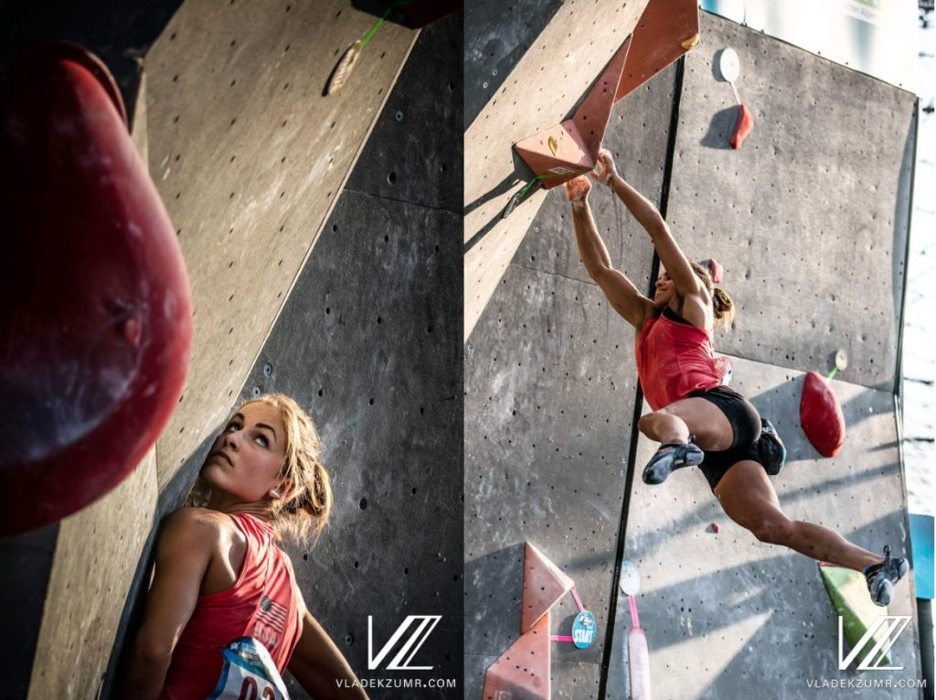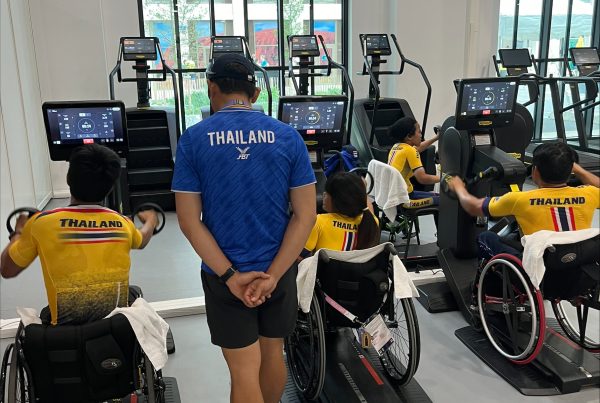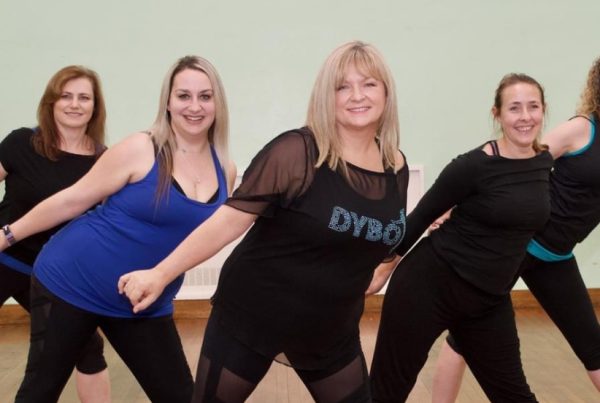Ranking internationally was just the start. Finding the mentality to sustain and grow became an unexpected challenge, says Lisa Chulich, a professional rock climber from Hermosa, California.
Growing up as athletes, we are told to “fight for your dreams; battle as the underdog with nothing to lose”. This is great – when you have no title to lose. But what about when you win? How do you handle this new challenge of maintaining your best?
I didn’t realise that once I had achieved my goal of a consistent top 25 placements on the International Federation of Sports Climbing (IFSC) World Cup Circuit, controlling the anxiety of losing that – and the ranking’s advantage – would become harder than some of the climbs themselves.
We may work decades to achieve a goal. This deep drive and passion can fuel us to success. Yet I learned that if we don’t separate our worth from performance, present from future, or confidence from ego, our success might slip away from our fingertips. In this article, I want to share some of the sports psych dialogue tackling these thoughts I encountered when returning to competition season after season. Navigating through this process brought to light different ways to approach progression in our lives that can be implemented both internally or while working with athletes on and off the court.
Detach self-worth from performance
To push our limits, we have to commit 100% mentally, physically and emotionally.
If our self-worth becomes inseparable from our results, we risk falling into dark holes of failure or anxiety. Which then puts our performance at risk. Executing at our best requires a deep confidence and discipline to only manifest successful thoughts. Fear of losing, on the other hand, can distract us during crucial moments, block our ideal flow state and lead to negative outcomes.
How do we invest fully without fearing loss? This is when I realised it was crucial to understand the importance of “I performed” versus “I am”.
Detaching self-worth from performance allows you to have a greater power and identity than just a singular result, while still investing 100% in the game. For instance, if you win a competition, YOU did that and can pull confidence from your performance. If you lose a championship, with a multi-dimensional worth, you are not now a failure. Instead, yes, you failed, but you are MORE than that result and are capable of creating a new strategy/becoming stronger.
To achieve this, our drive to want to win must be greater than one result. We must be willing to invest everything we have without hesitation.
Staying grounded in our worth beyond any particular success helps us to commit fully at an event, yet avoid spiking emotional defence associated with the threat of losing our identity. Removing that unwanted stress allows us to execute with a clearer mind.
Understand that you are more than your performance. Train with the mentality of “I can”, “I will”, and “I did” instead of “I am”.
Application: Embrace who you are, and your skillset, beyond your career outcomes. Use this to release the anxiety response and commit fully to your next goal in a success-driven mindset. When training athletes, emphasise that they have more potential than any one result.
Reverse anxiety surrounding failure
If we are scared of failure and play not-to-lose, it is more likely that we will.
To remove anxiety that is causing a preventative mindset, it is important to first understand that fear arises from contemplating future outcomes. Anxiety and fear of failure cannot exist if we are purely in the moment.
So how can we stay present?
Set your goal, then focus on the work. Creating a step-by-step plan, down to each day, allows you to concentrate on a specific task at hand and stay present in the moment. Trust your process and allow yourself to commit 100%. We can then enter an empowering mindset: PLAY TO WIN.

Lisa Chulich in action
Cultivate this through:
- Committing fully to what it takes to succeed.
- Trusting our training and skills.
- Sustaining self-worth beyond one result.
We can approach the competition as a challenge instead of a threat. This allows us to maintain an empowering mindset without becoming distracted by anxiety about outcomes. This can reduce the innate fear to make mistakes when performing with a positive frame of mind grounded in these pillars.
The pressure is removed by understanding that, while errors happen, we can overcome them, and we minimise them by focusing on our desired performance. Replace negative thoughts with a desire to win.
DREAM BIG, focus small. Make this present-focused mindset a habit and excel when it is time to perform.
Application: Define your goal, then focus on the daily or hourly tasks. Execute, rest, repeat. Only allow success in your mind by trusting your training.
Value vulnerability enough to adapt
Separating your worth from your performance allows you to have power beyond the outcome. It can allow you to refine and adapt. Pairing this with embracing enough confidence to be vulnerable is immensely useful in continuing to improve throughout your career.
For example, if your initial game strategy becomes less effective, tap into that power with an open mind to reflect, strategise and grow. Remember that you are more than your previous performance and have the ability to either figure out another plan or gain new strength.
A key part of this is trustworthy training partners! They became invaluable when pushing myself to get stronger and adapt in this ever-changing sport. Going through the process of vulnerability and improvement with athletes/coaches you trust can help maximise your growth.
In a healthy setting, you can hold each other accountable with empathy. In moments of doubt, your partner can realign you into a positive, self-fulfilling mindset of success. Ideally, this creates a healthy space you can improve in through vulnerable reflection.
Find the confidence and vulnerability to commit fully and grow.
Application: Trust in your training. Surround yourself with people committed to pushing each other with positive states of mind. As a trainer, show value in your athletes beyond their physical performance that day. Create a space where they know they will be held accountable, but also supported when working on their weaknesses.
Personally, I found a new sense of strength when tapping into all of this. It began with embracing worth beyond performance, adding deeper strength to my career. I then had to execute with a disciplined, present state of mind while empowering belief in myself to be vulnerable and adapt.
Take confidence from your training, then let go of the past. Sometimes defending a title is not about repeating the exact same strategies, more so being able to embody the champion mindset that is driven to succeed. Set a goal, then immerse fully in the present! We must play to win to continue pushing our limits.
Author Bio:
 Five-time USA team athlete, Lisa Chulich spent years travelling to compete on the IFSC World Cup Bouldering Circuit. She grew up as a competitive gymnast, starting at age four, then transitioned to climbing and volleyball in her teens. After taking both to national level, she graduated college with a BS in biology with a math minor, and dived deep into the science of her own training and other athletes she coached in functional strength/movement. Currently she is pushing her limits on the rocks and immersing in the science of recovery biotechnology.
Five-time USA team athlete, Lisa Chulich spent years travelling to compete on the IFSC World Cup Bouldering Circuit. She grew up as a competitive gymnast, starting at age four, then transitioned to climbing and volleyball in her teens. After taking both to national level, she graduated college with a BS in biology with a math minor, and dived deep into the science of her own training and other athletes she coached in functional strength/movement. Currently she is pushing her limits on the rocks and immersing in the science of recovery biotechnology.







